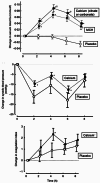Calcium Supplementation- Efficacy and Safety
- PMID: 39937345
- PMCID: PMC11821691
- DOI: 10.1007/s11914-025-00904-7
Calcium Supplementation- Efficacy and Safety
Abstract
Purpose of review: To assess the efficacy of calcium supplements in preventing fractures, and to review their adverse effects, particularly on the cardiovascular system.
Recent findings: There is now a large body of trial evidence demonstrating that calcium supplements do not prevent fractures in community-dwelling adults. They commonly produce gastrointestinal side-effects, sometimes serious, and increase the risk of renal calculi. Meta-analyses of adverse events from clinical trials suggest that the risk of MI is increased by 10-20% with calcium supplementation, though dietary calcium intake does not appear to be a cardiac risk factor. Ingestion of a calcium bolus increases circulating calcium concentrations for the following 8 h, accompanied by acute increases in blood coagulability and calcification propensity, with blood pressures > 5 mmHg higher than placebo-treated individuals. Mendelian randomization studies demonstrate that circulating calcium levels are a significant risk factor for cardiovascular disease, so the acute calcium-elevating effect of supplements might contribute to increased cardiovascular risk. The current balance of evidence suggests that calcium supplements have little role in the prevention or treatment of osteoporosis, since estrogen and bisphosphonates prevent fractures without their co-administration. Specific studies are needed to address whether calcium is benficial with anabolic bone medicines.
Keywords: Bone mineral density; Cardiovascular disease; Fracture; Mendelian randomization; Myocardial infarction; Osteoporosis; Renal calculi.
© 2025. The Author(s).
Conflict of interest statement
Declarations. Competing Interests: Dr. Reid reports personal fees from Amgen, personal fees from Medson Pharma, personal fees from Abbott India, outside the submitted work.
Figures

References
-
- Reid IR, Ames RW, Evans MC, Gamble GD, Sharpe SJ. Effect of calcium supplementation on bone loss in postmenopausal women. N Engl J Med. 1993;328(7):460–4. - PubMed
-
- Black DM, Bauer DC, Vittinghoff E, Lui L-Y, Grauer A, Marin F, et al. Treatment-related changes in bone mineral density as a surrogate biomarker for fracture risk reduction: meta-regression analyses of individual patient data from multiple randomised controlled trials. Lancet Diabetes Endocrinol. 2020;8(8):672–82. - PubMed
-
- Chapuy MC, Arlot ME, Duboeuf F, Brun J, Crouzet B, Arnaud S, et al. Vitamin D3 and calcium to prevent hip fractures in the elderly women. N Engl J Med. 1992;327(23):1637–42. - PubMed
-
- Grandfield K, Vuong V, Schwarcz HP. Ultrastructure of bone: hierarchical features from nanometer to Micrometer Scale revealed in focused Ion Beam sections in the TEM. Calcif Tissue Int. 2018;103(6):606–16. - PubMed
-
- Nicholls L, Nimalasuriya A. Adaptation to a low calcium intake in reference to the calcium requirements of a tropical population. J Nutr. 1939;18(6):563–77.
Publication types
MeSH terms
Substances
LinkOut - more resources
Full Text Sources
Medical
Research Materials

